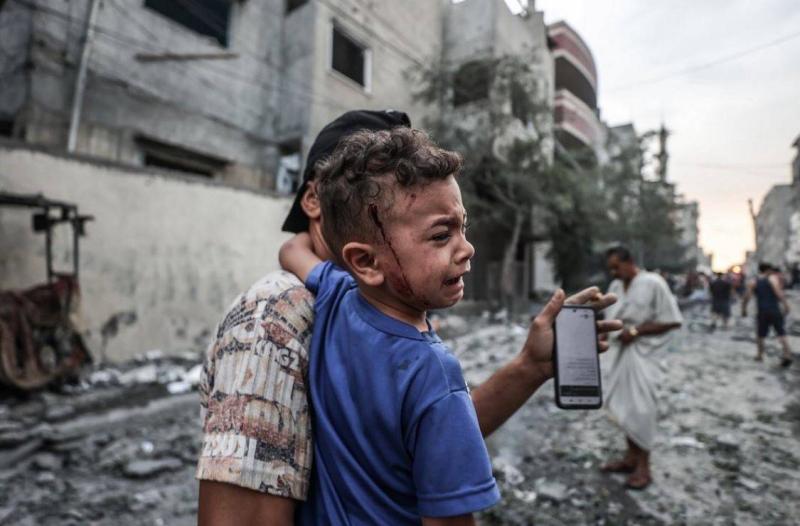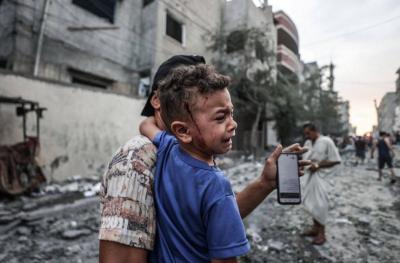The Gaza Health Ministry announced today, Tuesday, that more than 700 Palestinians have died in Israeli airstrikes during the night, marking the highest number of fatalities within 24 hours since Israel began its bombing campaign against Hamas militants, who had surprised Israel with an attack on October 7. Israel stated that it had killed dozens of Hamas fighters in the airstrikes but indicated that its war to destroy the Islamist group would take time. Relief agencies have warned of a humanitarian catastrophe in Gaza, while French President Emmanuel Macron headed to Israel to offer support. The Israeli army expanded its targeting of areas in Gaza, where around 50 people were killed in the past hour in strikes on buildings in Khan Younis.
About 20 trucks were unable to deliver aid to Palestinian civilians in the besieged Gaza Strip today, while U.S. President Joe Biden described the efforts to deliver aid through the Rafah crossing from Egypt as "not fast enough."
**Shoulder to Shoulder**
Macron told Prime Minister Benjamin Netanyahu that France stands "shoulder to shoulder" with Israel in its war against Hamas, emphasizing that Israel should not fight "without rules." The French President arrived in Tel Aviv today and met with Netanyahu and other members of the Israeli war cabinet in Jerusalem. He stated that France would not leave Israel alone in its war against Hamas but warned of the risks of a regional conflict. Netanyahu remarked that no one would "live under Hamas tyranny" after this conflict but cautioned that the war would take time.
**United Nations**
The United Nations urged Israel to allow more aid into the Gaza Strip, saying that the assistance permitted so far meets only a fraction of the needs of the besieged population. Fuel, which is still banned from entry, is vital. Rick Brennan, Director of the Emergency Program at the World Health Organization’s Eastern Mediterranean Regional Office, said, "We implore you to allow ongoing, expanded, and protected humanitarian operations.” United Nations agencies reported they had not received assurances that their relief workers would be safe to reach those in need. However, there seems to be little chance of a ceasefire anytime soon in what has become the deadliest episode in the Israeli-Palestinian conflict in decades. The Gaza Health Ministry stated that at least 5,791 Palestinians had been killed in strikes on the Strip since October 7, including 2,360 children. It added that 704 people were killed in just the past 24 hours. Ministry spokesperson Ashraf al-Qudra stated this is the largest number of fatalities in 24 hours over two weeks of Israeli attacks.
Abdullah Tabash clung to his deceased daughter, whose face and hair were stained with blood, as he carried her in his arms after she was killed in an airstrike in southern Gaza. He refused the pleas of people to let them take her body to bury her, saying, "This is my daughter, I want to indulge in her."
**Awaiting Orders**
Israeli tanks and troops gathered at the border between Israel and Gaza, awaiting orders to commence an expected ground invasion, an operation hampered by concerns over hostages. The Israeli army reported it had bombed more than 400 militant targets in Gaza last night, killing dozens of Hamas fighters, including three deputy leaders. The army stated in a release that among the targets struck was a tunnel that allowed Hamas to infiltrate Israel from the sea and command centers for the group in mosques. Israeli army spokesman Admiral Daniel Hagari stated that the army is "ready and determined" to enter the next phase of the war and is waiting for political instructions. However, it remains unclear when Israel may launch a full-scale ground invasion. The Israeli army faces a group that has built a powerful arsenal of weapons with Iranian help and is fighting in a densely populated area using a vast network of tunnels.
Medical officials in Gaza reported that dozens of Palestinians have been killed or injured overnight due to Israeli shelling, with 15 homes destroyed. Extensive areas of Gaza have been leveled due to Israeli bombardments, forcing over a million Palestinians to seek safe havens elsewhere in the Strip. Supplies of food, clean water, medicines, and fuel are rapidly running out.
Residents reported that an Israeli missile struck a gas station in Khan Younis, where workers and families had gathered after fleeing to the eastern side of the city. They added that several people were killed or injured. Abdullah Abu al-Ata, who lives next to the gas station, said, "This is a gas station, and there’s a solar energy station here, so people come to charge their devices and replenish water. They bombed them while they were asleep." Ashraf al-Qudra, spokesperson for the Gaza Health Ministry, noted that operations had halted in more than 40 medical centers after fuel ran out, and some were damaged due to Israeli bombardments.
**Do Not Give Israel a Blank Check**
Foreign governments have expressed concern that the conflict could ignite the entire Middle East. Clashes have already occurred in the West Bank and along the Lebanese-Israeli border. Fears of regional escalation are centered on Iran’s network of proxies in Syria, Iraq, and Yemen. Any broader fueling of the conflict jeopardizes U.S. interests and security in a vital region for global energy supplies. Qatar's Amir, who is trying to mediate between Israel and Hamas, urged the international community to restrain Israel in its war against Hamas. Sheikh Tamim bin Hamad Al Thani stated in a speech during the inaugural session of the Qatari Shura Council that "we say enough, Israel should not be given an unconditional green light and unregulated license to kill, and the realities of occupation, siege, and settlement should not continue to be ignored."




